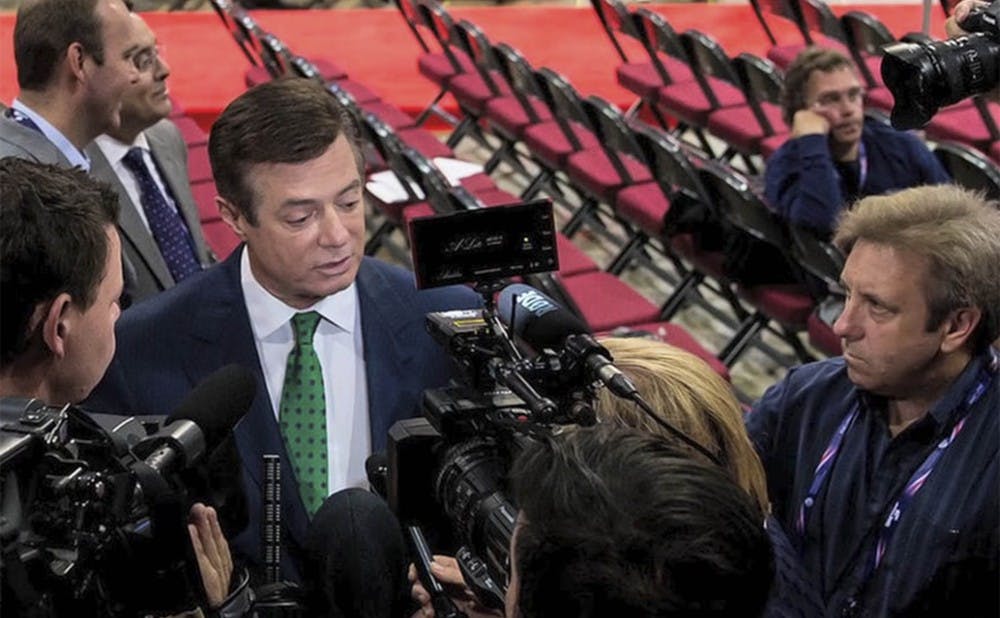The Associated Press reported last week that Paul Manafort—former campaign manager for President Donald Trump—had worked to assist the government of Russian President Vladimir Putin prior to joining the Trump campaign.
Manafort said in 2005 that he had employed "legal experts" to help him, including one from the University who remains unidentified, according to the report. But Duke administrators and faculty members who spoke to The Chronicle had no information to provide on who the unidentified “legal expert” was.
The AP report notes that Manafort and Oleg Deripaska, a Russian aluminum magnate and Putin ally, maintained a business relationship worth $10 million a year between 2006 and 2009. Manafort had proposed a plan to “influence politics, business dealings and news coverage inside the United States, Europe and former Soviet republics to benefit President Vladimir Putin's government.”
According to the Faculty Handbook, faculty and administrative staff are allowed to spend up to four days per month in outside consulting work, and all such activities must be reported on a financial conflict of interest disclosure form.
But several current and former administrators and faculty leaders at Duke had no idea who this alleged "legal expert" could be.
“Regarding this specific situation, if anybody from Duke was involved, it would have been in their capacity as an individual and not as a representative of the University, so we have no further information on it,” wrote Michael Schoenfeld, vice president for public affairs and government relations.
When prompted by The Chronicle about the Handbook’s rules stating that the professor would have been required to report such activity to the University, he wrote that he was unaware of who was involved or what activities were alleged. He opted to “pass on commenting on a hypothetical situation.”
Schoenfeld told The Chronicle that consulting disclosure reports would be given to the leaders of individual schools and institutes, and that the information would be considered confidential personnel information. An Office for Research Support website says that such activities should be reported to either the provost, or the dean for those in the School of Medicine, as well as a department chair.
Conflict of interest forms are kept confidential "except where a disclosure is required by law or for an administrative purpose," the ORS website’s frequently asked questions section reads. The ORS also reviews all of these forms.
The consulting policy in 2004 is consistent with the current version.
It is unclear whether the legal expert’s alleged actions would also have constituted “lobbying” in the Duke policy, which would have required reporting as well. The policy says that lobbying questionnaires are sent out to senior officers on a quarterly basis and to faculty on an annual basis to comply with the University's legal requirements.
Manafort never registered as a foreign agent, as required by federal law, the AP reported. Manafort was not registered as a federal lobbyist either, according to the Center for Responsive Politics.
Schoenfeld did not comment about the applicability of the lobbying policy to the situation outlined in the AP report, once again saying that he would not comment on hypotheticals.
Current and former leaders of the Law School, Fuqua School of Business and Sanford School of Public Policy from the time of the reported relationship said they did not know any professors who had worked with Manafort.
The Chronicle also contacted current and former professors with specific expertise in international law, none of whom said they had any information about the faculty member.
Bruce Jentleson, professor of public policy and political science and director of the Sanford Institute for Public Policy up to 2005, wrote in an email that he did not know who the “legal expert” was. He added that faculty members generally file outside employment disclosures with “some department in the Allen Building.”
Kip Frey, professor of the practice of public policy and law and law director of the program in law and entrepreneurship, said the "subject matter of the advice" typically is not the main reason for disclosure.
“Generally there isn't a substantive reporting requirement to the University unless the party we're advising has some relationship with Duke that might create the appearance of a conflict of interest,” he said. “There is a general requirement that we report outside activities as a matter of percentage of time spent, but the subject matter of the advice isn't what triggers the disclosure.”
Trump has maintained that he did not know details about Manafort’s international dealings. This comes at a time when concerns about the relationship between the Trump campaign and Russia have gained traction. Republican Sen. John McCain has even called for an independent commission on the matter.
White House Spokesman Sean Spicer has attempted to minimize the role Manafort had in the campaign, making a claim that PolitiFact rated "false" last week. Spicer also told the AP last week that Trump had no knowledge of Manafort's prior activities.
"To suggest that the president knew who his clients were from 10 years ago is a bit insane," he said.
The Chronicle contacted Jeff Horwitz, the AP reporter who wrote the original story, for more information about the "legal expert." Horwitz declined to provide documents supporting the story but said they did not give any further information to identify the expert.
If you have any information about the Duke “legal expert” who may have worked with Paul Manafort, please contact Adam Beyer at adam.beyer@duke.edu and Gautam Hathi at gautam.hathi@duke.edu.
Get The Chronicle straight to your inbox
Signup for our weekly newsletter. Cancel at any time.
Adam Beyer is a senior public policy major and is The Chronicle's Digital Strategy Team director.

